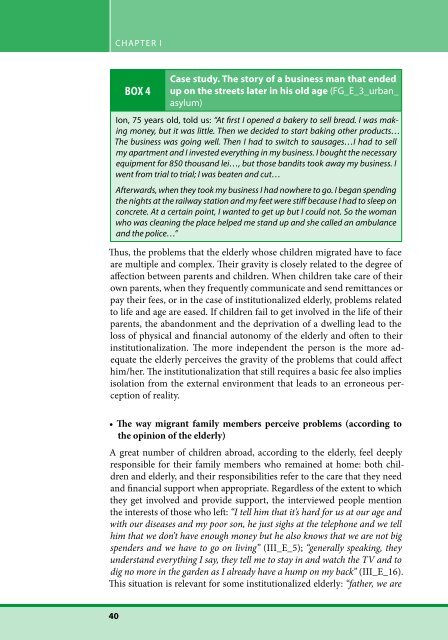specific needs of children and elderly left behind as a ... - IOM Moldova
specific needs of children and elderly left behind as a ... - IOM Moldova
specific needs of children and elderly left behind as a ... - IOM Moldova
Create successful ePaper yourself
Turn your PDF publications into a flip-book with our unique Google optimized e-Paper software.
CHAPTER I<br />
BOX 4<br />
C<strong>as</strong>e study. The story <strong>of</strong> a business man that ended<br />
up on the streets later in his old age (FG_E_3_urban_<br />
<strong>as</strong>ylum)<br />
Ion, 75 years old, told us: “At first I opened a bakery to sell bread. I w<strong>as</strong> making<br />
money, but it w<strong>as</strong> little. Then we decided to start baking other products…<br />
The business w<strong>as</strong> going well. Then I had to switch to sausages…I had to sell<br />
my apartment <strong>and</strong> I invested everything in my business. I bought the necessary<br />
equipment for 850 thous<strong>and</strong> lei…, but those b<strong>and</strong>its took away my business. I<br />
went from trial to trial; I w<strong>as</strong> beaten <strong>and</strong> cut…<br />
Afterwards, when they took my business I had nowhere to go. I began spending<br />
the nights at the railway station <strong>and</strong> my feet were stiff because I had to sleep on<br />
concrete. At a certain point, I wanted to get up but I could not. So the woman<br />
who w<strong>as</strong> cleaning the place helped me st<strong>and</strong> up <strong>and</strong> she called an ambulance<br />
<strong>and</strong> the police…”<br />
Thus, the problems that the <strong>elderly</strong> whose <strong>children</strong> migrated have to face<br />
are multiple <strong>and</strong> complex. Their gravity is closely related to the degree <strong>of</strong><br />
affection between parents <strong>and</strong> <strong>children</strong>. When <strong>children</strong> take care <strong>of</strong> their<br />
own parents, when they frequently communicate <strong>and</strong> send remittances or<br />
pay their fees, or in the c<strong>as</strong>e <strong>of</strong> institutionalized <strong>elderly</strong>, problems related<br />
to life <strong>and</strong> age are e<strong>as</strong>ed. If <strong>children</strong> fail to get involved in the life <strong>of</strong> their<br />
parents, the ab<strong>and</strong>onment <strong>and</strong> the deprivation <strong>of</strong> a dwelling lead to the<br />
loss <strong>of</strong> physical <strong>and</strong> financial autonomy <strong>of</strong> the <strong>elderly</strong> <strong>and</strong> <strong>of</strong>ten to their<br />
institutionalization. The more independent the person is the more adequate<br />
the <strong>elderly</strong> perceives the gravity <strong>of</strong> the problems that could affect<br />
him/her. The institutionalization that still requires a b<strong>as</strong>ic fee also implies<br />
isolation from the external environment that leads to an erroneous perception<br />
<strong>of</strong> reality.<br />
• The way migrant family members perceive problems (according to<br />
the opinion <strong>of</strong> the <strong>elderly</strong>)<br />
A great number <strong>of</strong> <strong>children</strong> abroad, according to the <strong>elderly</strong>, feel deeply<br />
responsible for their family members who remained at home: both <strong>children</strong><br />
<strong>and</strong> <strong>elderly</strong>, <strong>and</strong> their responsibilities refer to the care that they need<br />
<strong>and</strong> financial support when appropriate. Regardless <strong>of</strong> the extent to which<br />
they get involved <strong>and</strong> provide support, the interviewed people mention<br />
the interests <strong>of</strong> those who <strong>left</strong>: “I tell him that it’s hard for us at our age <strong>and</strong><br />
with our dise<strong>as</strong>es <strong>and</strong> my poor son, he just sighs at the telephone <strong>and</strong> we tell<br />
him that we don’t have enough money but he also knows that we are not big<br />
spenders <strong>and</strong> we have to go on living” (III_E_5); “generally speaking, they<br />
underst<strong>and</strong> everything I say, they tell me to stay in <strong>and</strong> watch the TV <strong>and</strong> to<br />
dig no more in the garden <strong>as</strong> I already have a hump on my back” (III_E_16).<br />
This situation is relevant for some institutionalized <strong>elderly</strong>: “father, we are<br />
40

















